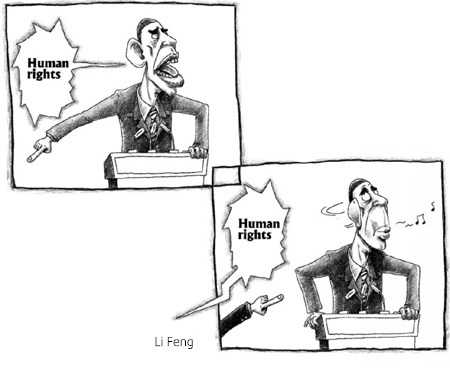Nations must learn how not to catch a tiger by its tail

US-China relations have gotten off to a less than roaring start in the Year of the Tiger, but the venom of snake-like incrimination can be avoided if both sides engage in some retrospection and put things in an historical perspective.
Indeed, the positive achievements of the world's most important bilateral relationship are so numerous, profound and complex, that it has become part of the landscape and second nature to younger generations who never experienced the frigid depths of the Cold War and the polarizing antipathies in which the global East and global West defined one another as the quintessential enemy.
While there's no space to enumerate the many people-to-people initiatives that made today's peaceful economic integration of two great economies possible, it is worth reminding ourselves that the rich and constant exchange of people and goods across the Pacific that we take for granted today was almost beyond imagination just a generation ago.
Because the mutual gains of economic interdependence and intellectual and cultural exchange have been such game-changers the accomplishments and sacrifices of previous generations may be obscured from view. Those who have contributed to US-China amity have built so sturdy an edifice that we find ourselves standing on a foundation of good deeds and accomplishments so massive that it is almost impossible to view as a whole.
The big picture is basically good, but because politicians are ruthlessly competitive and the drumbeat of the 24x7 media needs conflict to thrive (and sell more ads) we live in an age of angry nitpicking.
The tone of US-China argument is at times strident and acrimonious, full of false bravado and over-wrought nationalism. But in practical terms, we are talking about bumps on the road rather than insurmountable obstacles. The actual conflict has been on the level of a teapot tempest that vents more heat than light and rattles us today only to disappear tomorrow.
Speaking of tea, there is a link between the intransigence one sometimes sees in US-China relations and the "tea-parties" of domestic politics. When frustrations mount, raw emotion sometimes wins the day and ridiculous, counterproductive things are said and done. All this would be funny if it were not for the fact that such hyped-up "manufactured dissent" distracts from serious dialogue and deters the search for joint solutions to important problems such as degradation of the environment and global warming.
China-bashing, from the US side, and America-bashing from the Chinese side, are to global harmony what tea parties are to American democracy. Goodwill is frittered away and the foundations for dialogue dismantled in the quest to score points and snag some short-term gain.
The breakdown of dialogue in the US Congress is so severe that respected lawmakers are quitting just to get away from the mudslinging. In China, as in the US, jostling for power and prestige, rather than working devotedly in service of the people, is a recipe for self-inflicted disaster.
The peace and prosperity we enjoy today, a heroic accomplishment built on the backs of less fortunate ancestors, is threatened by a lack of cultural humility and historical perspective.
A quick review of some current contentious issues underscores the value of putting things in a historic perspective, with introspection enough to consider how others might view the same problem.
How can we talk about Tibet without referring to the region's sorry feudal past, interventionist US and British political machinations, CIA funding of the Dalai Lama and so on?
How can we talk about US arms sales to Taiwan without referring to a half-century of US weapon sales, set in motion by a well-oiled anti-China lobby, without considering its divisive influence, not to mention the corruption and military profiteering involved?
On the question of Iraq, China proved to be on the right side of history. China did not join the trumped up "Coalition of the Willing" that cheered the US invasion of Iraq in 2003, setting in motion a long, dirty war based on lies, deception, vendettas and opportunism.
Given the precedent of Iraq, how can the US and Britain chastise China for not chastising Iran when the US and British have a documented history of meddling both in Iraq and Iran, including the overthrow of governments, installation of pro-West puppet governments and exploitation of oil?
How can the US State Department and NSA, in cooperation with Google, assume the high-ground in complaints about mail-prying and information control in China when Google itself has become one of the world's biggest invaders of personal privacy and human rights with its Orwellian surveillance capabilities, aggressive data-mining and creation of individual files and advertising profiles, based in large part on the science of reading other people's mail?
How can the US lecture China on the proper way to handle militant Muslims in the Xinjiang Uygur autonomous region, when it is bombing and shooting militant Muslims on a daily basis in Iraq, Afghanistan and Pakistan?
What about human rights? History shows that every nation has at times been callous in its treatment of its people. There are human rights problems and judicial injustices both in China and the US that need to be addressed.
But the US, which incarcerates more people for longer prison terms than any other country in the world, including jail for non-violent offences, is not in a good position to do the talking. Nor do anti-communist agitators and National Endowment of Democracy funded groups promote honest dialogue. Instead, the neo-conservative noisemakers use their phony high-dudgeon righteousness as a needle to prod China.
But human rights is important, and independent groups not attached to the US government such as Amnesty International and Duihua, as well as lawyers and lawmakers in China, have a role to play. More to the point, over-aggressive policing and unfair judicial decisions, whether in the US or China, are national problems, even a matter of national shame, but not true bilateral issues.
Good foreign policy, like a good human rights policy, starts at home. The US and China both would be well advised to engage in some introspection and reflection, attending first and foremost to problems of their own making, problems in their own backyards, before pointing fingers at one another and spoiling the peace and prosperity that so many worked so hard at so much cost to achieve.
The author is professor of media studies, Faculty of Social Studies, Doshisha University, Japan.

(China Daily 02/23/2010 page9)














